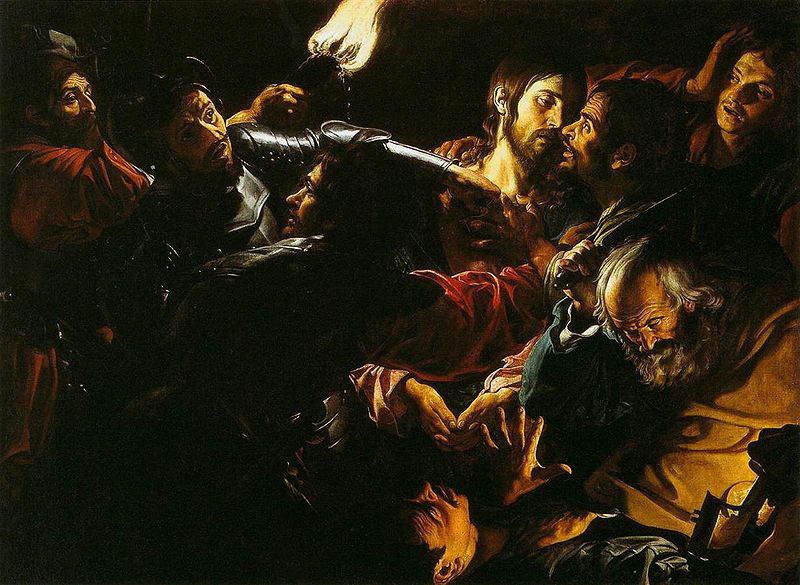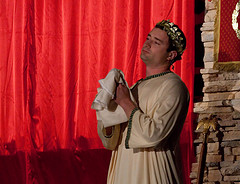
The Capture, Trial and Crucifixion of Jesus
Yeshua and his entourage were outmanoeuvred. The Romans swooped on them in the garden of Gethsemane while Jewish residents slept. John claimed a cohort of soldiers was consigned to collar Jesus:
“Judas the traitor knew the place well, since Jesus had often met his disciples there, and he brought the cohort to this place together with a detachment of guards sent by the chief priests and Pharisees, all with lanterns and torches and weapons” (John 18:3 JB.)
Someone had betrayed Yeshua to the Romans. A cohort was six hundred Roman soldiers, one tenth of a legion. Pilate would not have sent this many men to arrest an agreeable, unarmed, peace-loving preacher who thought he was God. Yeshua was a big fish with an entourage of admirers, swimming in a city packed with potential patrons, so he needed to be decisively dealt with before things got out of hand.
Some of Yeshua’s disciples were with him at the time of his arrest. One or more of them was supposed to be on watch. It must have been intimidating to have that many soldiers tramping toward you in the dead of night, torchlight reflecting off their swords and armor, shining up a silhouette of trees in the distance. It was probably no contest. The Gospels make out that Jesus was surprised that force was used to capture him:
“And Jesus answered and said unto them, are ye come out, as against a thief, with swords and with staves to take me?” (Mark 14; 48, KJV)

This does not ring true, particularly when we read in John that
“Then Simon Peter having a sword drew it, and smote the high priest’s servant, and cut off his right ear. The servant’s name was Malchus.” (John 18; 10, KJV.)
Most of Yeshua’s mates dashed off into the dark, leaving him to his fate. They had been taken by surprise, outplayed by more experienced, more professional opponents. Yeshua was trumped before he had made his master move. Yeshua was taken into custody, so was unable to issue instructions. His allies had let him down, and he must have known what was in store for him. Luke claimed Jesus was sweating blood (Luke 22; 44.) Luke was trying to tell how terrified Jesus was about his impending crucifixion.
Much is made in the Gospels about Peter’s remorse for disowning Jesus. There were others in the troop too terrified to put their lives on the line, and they must have felt just as guilty. The fact that Peter had to lie about his identity suggests that Roman soldiers were chasing anyone who was part of the gang of insurrectionists.
Yeshua would have felt abandoned not only by his friends but also by his God. His work and dreams had come to nothing, and he probably played the last card of a wretched man by begging his God for a miracle.
The Trial
Matthew claims Jesus was arrested because he claimed he was divine, but Yeshua did not fantasize that he was God. Jews believed in only one God, Yahweh. Yeshua would not have had any helpers if he had made a blasphemous claim that he was God.
Nor could the Romans have cared less about a peasant’s delusions of grandeur. The Romans never got involved in Jewish religious disputes unless they turned into a security issue. The high priest, the Sanhedrin, the Pharisees, Pilate, and his army all knew Yeshua had hoped to start a rebellion against Rome.
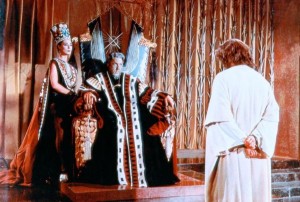
All the Gospel authors made out Jesus was given a trial. Jesus was taken before Pilate and the accusation made:
“We found this fellow perverting the nation, and forbidding to pay taxes to Caesar, saying that he himself is Christ, a King.” (Luke 23:2 NKJ.)
Pilate asked Jesus if he was king of the Jews and Jesus answered,
“It is as you say it” (Luke 23:3 NKJ.)
This perfectly described the crux of the issue: Jesus was accused of undermining the government and the taxation system. Jesus effectively signed his own death warrant by admitting he thought of himself as the King of the Jews.
Genuine Jewish kings did not pay Roman tax, so this contradicted Jesus’ earlier injunction to render unto Caesar that which belongs to Caesar (see Matthew 22:21.)[1]
Luke was the only Gospel author who claimed that Jesus was taken before Herod. Luke states Jesus refused to talk to Herod. Yeshua would have hated Herod, the man who had his cousin beheaded. Herod supposedly found Jesus not guilty, but this makes no sense, as Luke had earli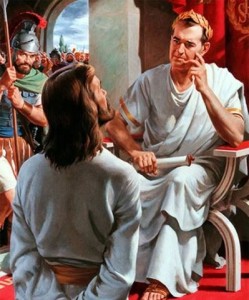 er claimed that Herod wanted Jesus killed. (Luke 13:31.)
er claimed that Herod wanted Jesus killed. (Luke 13:31.)
Mark claimed,
“… the chief priests however had incited the crowd” (Mark 15:11, NJB.)
This poorly explained excuse was the only reason given in any of the Gospels for “the crowd” turning against Jesus. This crowd supposedly shouted that they would rather have a common criminal, Barabbas, freed instead of Jesus. No such custom of releasing the crowd’s favorite was ever recorded in any non-Biblical document. Mark implied this crowd was made up of Jerusalem’s people, whom Mark had earlier described as the “multitudes” who had welcomed Jesus as a king and a hero in a ticker tape parade when he rode into the city. This same Jewish crowd thought Jesus was a prophet and had laid clothes and branches at his feet. The chief priests feared the Jewish people would create an uproar if Jesus were arrested. Can anyone believe Jerusalem’s people had such a complete change of mind about their hero?
Romans were made to look as if they w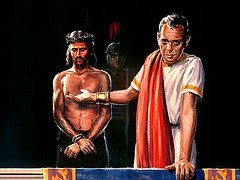 ere really sympathetic towards Jesus. Pilate, the Roman governor, allegedly read a letter from his wife about a dream she had that Jesus was innocent. Pilate supposedly said,
ere really sympathetic towards Jesus. Pilate, the Roman governor, allegedly read a letter from his wife about a dream she had that Jesus was innocent. Pilate supposedly said,
“I find no fault in this man” (Luke 23:4 KJV.)
Pilate is depicted as trying to talk the angry Jews out of having Jesus crucified, but gave in to the public clamor, because
“… in fact a riot was imminent” (Matt. 27:24 KJV.)
So the crowd that was going to riot if Jesus was arrested (see Matt. 26:3–6) was now about to riot if Jesus was not crucified. This scenario makes no sense. It is obvious that most of Jesus’ Jewish compatriots, that is the common people, idolized him, and would not have wanted him crucified! Therefore this passage is almost certainly a pro Roman fabrication.
 Pilate, Rome’s representative, allegedly washed his hands of any responsibility for the decision to kill Jesus. This did not happen; it was theatrical propaganda, not real history. To pronounce a man innocent, and then command your troops to kill him anyway, is preposterous.
Pilate, Rome’s representative, allegedly washed his hands of any responsibility for the decision to kill Jesus. This did not happen; it was theatrical propaganda, not real history. To pronounce a man innocent, and then command your troops to kill him anyway, is preposterous.
Pilate’s job was to keep the peace and make sure Jews paid tax. Jesus was a dangerous subversive, threatening a rebellion, so Pilate could not have found him innocent. There was probably no public trial. To have a public trial at that time of year would be just asking for trouble, particularly as it is made abundantly clear that Jesus had a firm contingent of support amongst the people.
Pilate was the Roman prefect of Judaea from AD 26–36. He is described by contemporary secular historians as being notorious for his cruelty toward the Jews. For example Philo, an Alexandrian Jew, writing in 41 CE, stated that Pilate’s tenure in power was notable for its
“ . . . briberies, insults, robberies, outrages, wanton injustices, constantly repeated executions without trial, and ceaseless and grievous cruelty” (Legatio ad Gaium, 301–302.) Josephus too reported several instances of Pilate flagrantly inciting an insurrection, only to ruthlessly suppress it with his soldiers.
In 36 CE, Vitellius, the Roman Syrian governor, removed Pilate from his office after a violent attack on the Samaritans (Josephus, Antiquities 18.4.85.) Pilate was ordered to Rome to face complaints of excessive cruelty against the Jews, found culpable, and exiled to Vienne, France. Pilate’s true colors come across in secular history, not in the Gospels. The real Pilate clearly was not a character wracked with ambivalence about whether to crucify Yeshua.
The Crucifixion
One of the authors of Matthew had Jews say,
“His blood be on us and our children” (Matt. 27:24–25, NJB.)
Jews publicly cursed themselves for being Christ-killers, which is h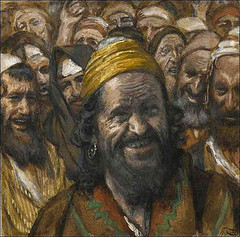 ighly improbable.
ighly improbable.
The Jewish passersby allegedly mocked Jesus:
“The passersby jeered at him; they shook their heads and said ‘if you are God’s son, come down from the cross!’” (Matt. 27:39 – 40, NJB.)
Yet the Jewish crowd would not have been that callous to one of their own. They would have been appalled that Jesus was dying such a despicable death.
Moreover, if his fellow Jews had wanted to kill Jesus, he would have been stoned to death, which could only have happened if the Romans gave the Jews permission to do so.
The Gospel authors could not have Romans responsible for killing the Son of God, because the Catholic Church, who promoted the Gospels, became the Church of Rome. The solution was simple; they made the Romans look like unwilling participants in the proceedings, and they accused the anonymous Jewish rabble of wanting Jesus dead.
 Crucifixion was an agonizing, demeaning, public death, one reserved for insurgents. It was used by Romans to intimidate anyone who might undermine their authority. The Roman soldiers nailed zealots up naked on a cross; it was part of the humiliation. The degrading death was designed to discourage other charismatic leaders from having their own dangerous dreams.
Crucifixion was an agonizing, demeaning, public death, one reserved for insurgents. It was used by Romans to intimidate anyone who might undermine their authority. The Roman soldiers nailed zealots up naked on a cross; it was part of the humiliation. The degrading death was designed to discourage other charismatic leaders from having their own dangerous dreams.
The sign or “titulus” (Latin for “inscription” or “label”) was the Roman way of exhibiting the explanation for the execution. It was written by Pilate, and read “King of the Jews,” a reflection of Jesus’ real crime.
Luke had a dying Jesus say
“Father, forgive them, they do not know what they are doing,” (Luke 23:34, NJB)
 referring to the Roman soldiers who had just scourged, mocked and nailed him naked to a cross. It is hard to imagine that Yeshua said this. He is more likely to have damned these soldiers with his dying breaths!
referring to the Roman soldiers who had just scourged, mocked and nailed him naked to a cross. It is hard to imagine that Yeshua said this. He is more likely to have damned these soldiers with his dying breaths!
A Roman centurion supposedly said,
“In truth this was the Son of God” (Matt. 27:54, NJB.)
Yet Christianity, which claimed Jesus was the Son of God, had yet to be invented!
The two men Yeshua was crucified with were labeled as “lestai,” incorrectly translated in some Bibles as “robbers.” In fact “lestai” was a derogatory term for insurrectionists, who, by armed action, opposed Roman rule.[2] [3]
So the Roman soldiers crucified Jesus between two zealots, it is written that Jesus thought he was the King of the Jews, and yet the reader is expected to believe that Jesus was a pacifist preacher without any political ambitions!
Roman law allowed no burial rights to those killed by crucifixion. Yeshua’s body would have been left on display for birds and dogs as a deterrent to others who might disobey Rome, although it is possible that Pilate made an exception and gave permission for the body to be buried.
Yeshua was dead, a deeply disheartening development. Yet all was not lost. Yeshua was only one man. The Nazarenes could bounce back, just as they had after John’s demise. Someone charismatic needed to take control. That person was James, Jesus’ brother.
[1] http://www.infidels.org/library/modern/james_still/jesus_trial.html
[2] http://www.drabruzzi.com/jesus_movement.htm,
[3] http://haqol.wordpress.com/2010/12/30/the-updated-niv-translates-translates-lestai-rebel/


